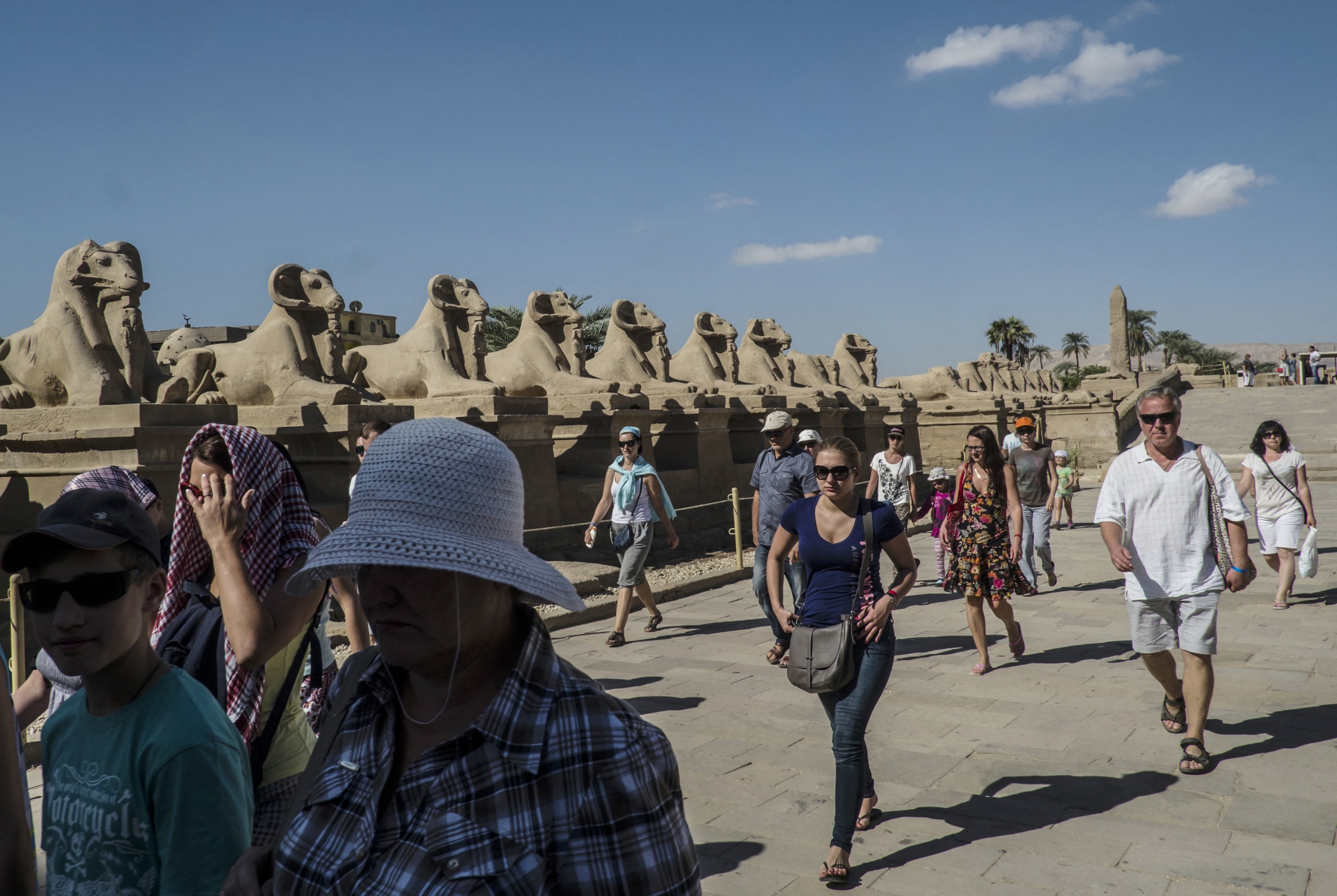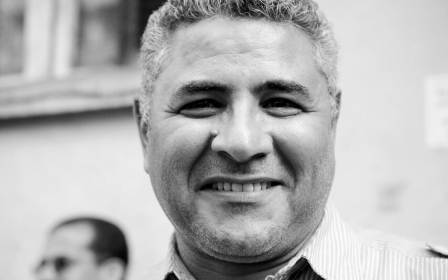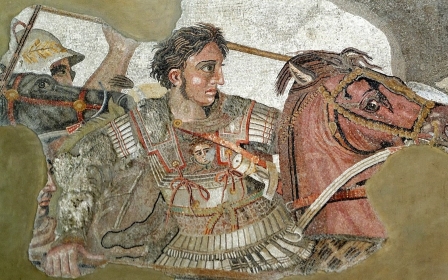Russia-Ukraine war: Egypt hoping Turkey will solve its latest tourism crisis

Egypt has unveiled an ambitious plan involving Turkey to rescue its ailing tourism industry, which has been brought to its knees by the war in Ukraine.
Before the Covid-19 pandemic, tourism contributed 12 percent to the country’s gross domestic product and employed one in every 10 members of its 29 million-strong workforce.
In 2019, 13 million people visited Egypt, which is heavily reliant on tourism. That number halved in 2021 because of the pandemic.
In peak years, almost a third of tourists in Egypt come from Russia and Ukraine. The Red Sea resorts of Sharm el-Sheikh and Hurghada have received millions of tourists from the two countries.
'Egypt can attract Russian tourists through Turkey'
- Ghada Shalabi, Egyptian official
But Russia’s invasion of its neighbour has grounded flights between the countries and choked off numbers to Egyptian resorts. At present, no Russian tourists are coming to Egypt.
New MEE newsletter: Jerusalem Dispatch
Sign up to get the latest insights and analysis on Israel-Palestine, alongside Turkey Unpacked and other MEE newsletters
Hotels in Sharm el-Sheikh and Hurghada are already feeling the absence. Soon after the invasion, half of the resorts’ rooms were empty, with locals expecting the situation to deteriorate further.
“The war has had a strong effect on [hotel] occupancy in the two cities,” Mohamed Ayoub, a board member of the Egyptian Hotel Association, an independent union of the nation's hotel owners, told Middle East Eye.
“This is, of course, making it difficult for the hotels to meet their financial obligations, including the payment of salaries for their workers.”
In crisis mode, Egypt’s tourism planners say they are working day and night to rescue the sector.
Enter, Turkey
The tourism authorities’ main strategy is to get Russian tourists back into Egypt. This can be done, they say, by enlisting the help of a third country. Turkey, whose tourism sector is also suffering because of the war, could be the ideal candidate, they believe.
Egypt and Turkey could help hash out alliances between national airlines to offer joint packages with other countries in the region, local tourism specialists suggest.
The Egyptians hope they will be able to bring Russian tourists back to Egypt by having them stop in Turkey en route.
Passengers would either fly to Turkey and then on to Egypt, or would be on a joint holiday package that would see them visit both countries. However, sanctions imposed on Russia mean that joint holiday packages might not be possible.
“Egypt can attract Russian tourists through Turkey,” a local newspaper quoted Egyptian tourism ministry official Ghada Shalabi as saying.
This would be the first tourism cooperation between Cairo and Ankara - the two places have in recent years been divided along political, geostrategic and ideological lines.
Throughout the political conflicts, however, economic ties have held, and the past few months have even seen some gradual rapprochement.
“The two countries stand a good chance of cooperating together in order to evade the adverse effects of the war in Ukraine on their tourism sectors,” independent tourism expert, Magdi Selim, told MEE. “Egypt, I believe, is working to start this cooperation in the coming period.”
Turkish officials have so far not made any public statement on the scheme, which is still in the planning stages. It has not been reported in the Turkish media.
Obstacles to plan
Despite strong support from the nation's tourism specialists and investors, the plan faces obstacles. The package of sanctions imposed on Russia in the aftermath of its invasion of Ukraine has crippled the Russian economy and sent the rouble plummeting.
“The sanctions are stripping Russians of the ability to travel outside their country,” Alaa al-Ghamri, a member of the Egyptian Travel Agents' Association, told MEE. Egypt's desire to attract Russian tourists via another country would only raise the cost of travel.
Other experts say the war could hinder Russian tourists from travelling outside their country for many years to come. As reported by MEE, Russians leaving the country for the Middle East are fleeing as exiles, not jetting off as tourists.
The war is also impacting tourism in Eastern Europe as a whole, with Russia closing off its airspace to carriers from 36 countries. The region is now all but closed for Egypt, both as a destination for Egyptians and as a source of visitors to Egypt.
This is why tourism experts are suggesting that an increased dependence on western European states is unavoidable.
New markets
Egypt’s tourism industry has had to bounce back before. In 2015, a Russian passenger plane headed to St Petersburg was downed over Sinai soon after it took off from Sharm el-Sheikh airport. The Egyptian affiliate of the Islamic State (IS) group claimed responsibility for the attack.
'Expected tourist inflows from Latin America and Southeast Asia might not be large enough to compensate for the loss of tourists from Russia'
- Ali Ghoneim, Egyptian Federation of Tourist Chambers
All 224 passengers and crew members died in the crash, which triggered a long series of travel bans on Egypt, especially from Russia, which only resumed flights to the Arab country last year.
As Russian tourism drops off once again, Egypt’s tourism planners are turning their eyes to new markets, including South America and Southeast Asia.
“Now is an opportune time to attract tourists from countries in these regions,” Ayoub said. “The two regions have not been as deeply affected by the war as other regions.”
Hundreds of thousands of South American and southeastern Asian tourists have visited Egypt over the past few years, raising hopes among tourism officials and investors.
Authorities are reportedly in talks with the civil aviation ministry to increase the number of Egyptian flights going to both regions.
“Expected tourist inflows from Latin America and Southeast Asia might not be large enough to compensate for the loss of tourists from Russia,” Ali Ghoneim, a member of the Egyptian Federation of Tourist Chambers, told a local newspaper.
“However, the high prices of the packages to be sold to these tourists can make up for the loss of the European market.”
Arab tourists
The ongoing war in Ukraine will make it harder for wealthy Arabs to visit Europe - particularly the continent’s eastern half - this summer. As a result Egypt, a major destination of Arab tourists, aspires to attract Arab travellers who would usually go to Europe.
Almost 20 percent of tourists arriving in Egypt before the outbreak of the Covid-19 pandemic came from Arab countries, according to the Egyptian Ministry of Tourism and Antiquities.
Close proximity between Egypt and Arab Gulf states, tight security conditions in Egypt, decent prices and a shared language can play a role in attracting more Arabs to Egypt, specialists say.
"Arab tourists are one last remaining ray of hope on the road to rescuing the tourism sector,“ Basil al-Sisi, the owner of a major travel agency, told MEE.
The impact on the tourism sector is just one detail in the large picture of the price Egypt is paying because of the war in Ukraine. Egypt, which is heavily dependent on wheat imports from Russia and Ukraine, now has to find alternative suppliers.
It has already started making internal adjustments to compensate for the potential loss of wheat supplied from outside sources, including incentivising local producers to grow more and threatening those that don't with imprisonment.
Commodity prices are also rising across the board, and foreign capital is leaving the country. It is in this context that the people shaping Egypt’s tourism policies are looking to build and repair.
Middle East Eye delivers independent and unrivalled coverage and analysis of the Middle East, North Africa and beyond. To learn more about republishing this content and the associated fees, please fill out this form. More about MEE can be found here.







